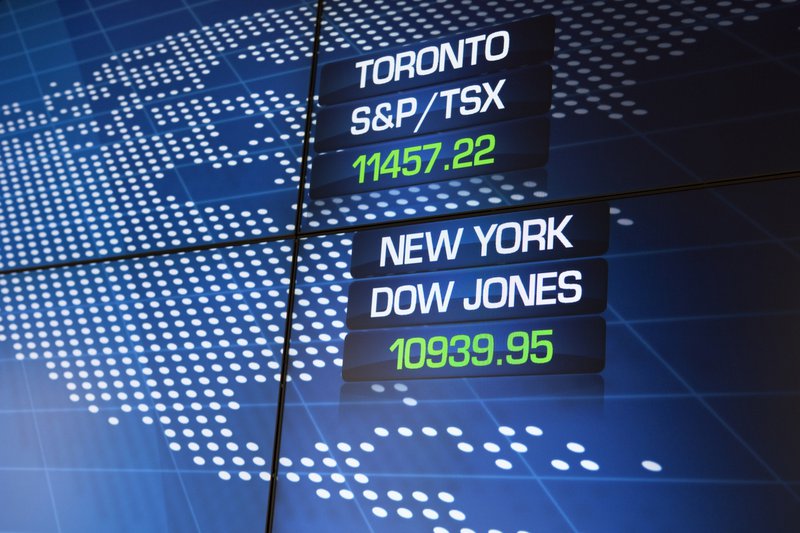
FERGAL SMITH
Aug. 27, 2020
Canada’s main stock index is set to extend its rebound over the coming months and in 2021, boosted by an expected recovery in corporate earnings after they were hammered by the coronavirus pandemic, a Reuters poll found. The outlook for Wall Street stocks isn’t nearly as robust.
The median forecast in a survey of 27 portfolio managers and strategists was for the S&P/TSX Composite Index to rise 2.3 per cent to 17,000 by the end of 2020 from a closing level of 16,617.48 on Tuesday, leaving it nearly unchanged for the year.

It is expected to climb further to 18,000 by the end of 2021, exceeding the record high it notched in February at 17,970.51. In March, the Toronto stock market plunged to its lowest level in more than eight years at 11,172.73.
“The road to full economic recovery is long, but a rebound in economic activity and corporate earnings over the remainder of the year and through 2021, along with ongoing monetary policy stimulus, provide broad support,” said Angelo Kourkafas, an investment strategy analyst at Edward Jones.
Earnings for the TSX Composite are expected to grow by more than 34 per cent in 2021, led by health care and consumer cyclical shares, after an estimated contraction of about 25 per cent in the current year, I/B/E/S data from Refinitiv showed.
“We believe that a sustainable recovery is underway as the domestic economy gradually reopens,” Mr. Kourkafas said.
A staggered reopening from lockdowns, supported by fiscal stimulus, is likely paying off for Canada’s economy, with activity forecast to rebound in the current quarter twice as fast as in the United States, its biggest trading partner by far.
Improved prospects for growth could provide a boost to energy and financial shares, which tend to be sensitive to the economic cycle and account for more than 40 per cent of the Toronto market’s value.
“The TSX remains heavily geared towards financials and energy,” said Dominique Lapointe, a senior economist at Laurentian Bank Securities, adding that for both sectors “the worst seems to be over and therefore we can only see a somewhat more constructive outlook in the coming months.”
Oil has rebounded this month to as high as $43.52 a barrel after trading below zero in April, while gold notched in recent weeks a record high of $2,072.50 an ounce. The materials group, which includes precious and base metals miners, has rallied more than 26 per cent this year, outpaced only by information technology.
“Commodity price action may continue to influence the TSX along with a possible Canadian snap election if it actually happens,” said Colin Cieszynski, chief market strategist at SIA Wealth Management.
A crucial confidence vote on the Liberal Party government’s COVID-19 economic recovery plan is expected in late September. Prime Minster Justin Trudeau needs the support of at least one of three opposition parties to stay in power.
WALL STREET
Wall Street’s rally, which this year has been much more robust than Canada’s, is likely run out of fuel as investors fret about the November presidential election, with the major indexes ending 2020 below current record highs, according to a separate Reuters poll conducted over the past two weeks.
The S&P 500 will end 2020 at 3,300 points, down more than 4 per cent from current levels, according to the median forecast of about 55 market strategists and fund managers.
That would leave the closely watched benchmark with an annual 2-per-cent gain in a year that saw the novel coronavirus cripple the global economy and leave millions of Americans out of work.
Uncertainty about the outcome of the Nov. 3 presidential vote and how it affects markets is becoming a major concern for investors.
For weeks ahead of the 2016 election, strategists warned that instability caused by a potential Donald Trump victory would hurt Wall Street, only to see markets rally after he won.
With Mr. Trump repeatedly claiming, without evidence, that plans to allow mail-in ballots would lead to a surge in electoral fraud, some investment strategists warn that uncertainty about the integrity of the vote and its outcome could roil financial markets.
So could a potential knockout blow by Democrats, giving the party control of Congress, as well as the executive branch, which could lead to higher taxes and tighter regulation, some respondents said.
“The market is not pricing in the potential for a Democrat sweep in November, which would create massive headwinds for the economy and the markets,” said Synovus Trust portfolio manager Daniel Morgan.
The S&P 500 last week returned to record highs for the first time since February, wiping out all of the deep losses caused by the coronavirus pandemic. The index’s new highs confirm, according to a widely accepted definition, that the S&P 500 entered a new bull market after tumbling to a low on March 23.
Behind the S&P 500′s more than 50-per-cent recovery have been bets on a potential coronavirus vaccine, trillions of dollars in fiscal and monetary stimulus and a surprisingly high percentage of companies that beat earnings expectations in the second quarter.
Still, many investors worry about the disconnect between the stock market and the U.S. economy, which remains crippled by high unemployment and a resurgence in virus cases in parts of the U.S.


